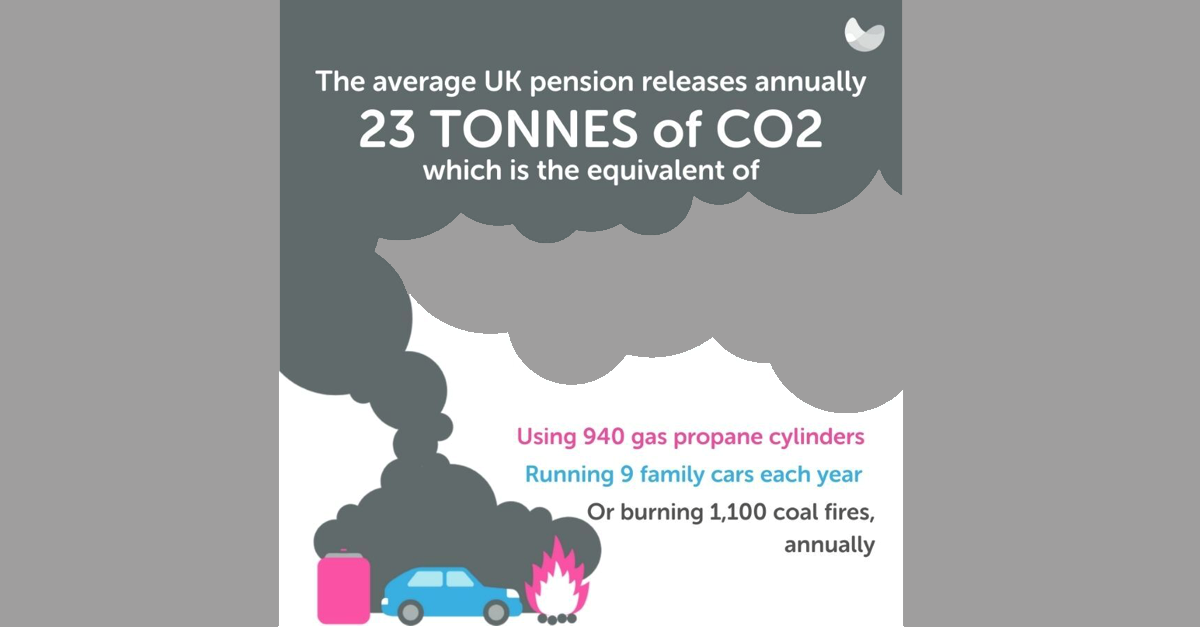Our research shows that 2 of the top 5 agenda[1] items for most HR teams are how to get employees more engaged with their workplace pension and getting them to contribute more. But what if solving these two important problems creates an unintended consequence of damaging the environment?
A little-known fact is that the average UK pension member, through their pension investments, pays for 23 tonnes of CO2 emissions a year[2]; that’s equivalent to running 9 family cars or burning 1,100 coal fires[3]. Multiple this by the number of employees and even a relatively small company with 100 employees in a pension scheme is potentially contributing up to 2.3k tonnes of CO2 emissions a year.
It’s a massive amount that for many employers dwarfs any emissions they create from their regular business activities. If we’re going to solve the pension engagement problem without adding to the climate crisis, the link between climate change and our pensions needs to be realigned.
But how can this be achieved? Simply put, by moving to a provider that offers a pension that is Net Zero Now. In other words, a pension with a default investment strategy that has consciously dealt with CO2 emissions so employees can save for retirement whilst helping to tackle climate change.
Not only does a Net Zero Now pension realign these two important issues, but it could improve engagement rates, especially amongst younger employees. 62% of employees[4] told us that they would engage more with their pension if they knew it was making a positive impact on climate change. This stat increases to nearly 74% for under 25s.
Climate change is a massive worry for 84% of us but especially for younger people. In fact, the environment is the second most important issue for under 25s behind only health[5]. The concern is that most don’t know how much damage their pension is doing; 99.5% of employees don’t know the extent of the issue. But the lid is beginning to lift and as employees get to know more, they are concerned and expect their employer to be doing something about it.
88% of employees told us that they want their employer to take some sort of action including moving to a pension provider that is making a positive impact on climate change and nearly 57% want more transparency on how their pension is invested.
And it’s not just about more information, employees want more of a say in the way the companies their pension is invested in are run. Climate change is about activism and increasing number of people are no longer prepared to take a passive stance; they want to be involved. Over 62% of employees confirmed that they want the opportunity to have a say in how the companies their pension is invested in are run. And when it comes to pensions, this is about voting rights.
Ultimately, it’s the fund managers who hold voting rights, but that doesn’t mean that employees can’t influence the way they vote. For instance, through our mobile app, we’ve recently launched voting functionality which enables employees to have their say on how companies they are invested in deal with broader global issues including gender equality, animal welfare and of course , the environment.
As employees get more involved, they become more engaged with their pension. Suddenly, pensions aren’t just about retirement, they’re about harnessing the power of capital and letting it become a force for good now, not just in 20, 30- or 40-years’ time.
But the impact of pensions on climate change is not just about the underlying investments, it’s also about the way employees interact and manage their pension. For instance, the industry is well known for the reams of paper it generates. At least once a year, most of us receive an enormous package containing our annual pension statement which, if it gets opened, is not fully understood, if read at all.
57% of employees don’t usually read it or if they do, they only skim read it before throwing or filing it away. It’s a whole lot of unnecessary paper and it’s further damaging the environment. We all now manage most things through an app on our mobile phone and we expect to manage and access information about our pension in the same way. 66% of employees confirmed that they would engage more with their pension if they could manage it through a mobile app.
In conclusion, we need to get people more engaged with their pension and saving more for retirement. But this can’t be at the expense of the planet. Employees are starting to understand the impact their pension is having on climate change and they want something to be done about it. When it comes to workplace pensions, the ultimate power lies in the hands of the employer and employees are saying, “please do something about it, now”.
To provide more insight into the issue and what needs to change to improve things, we are running a live event on Tuesday 22nd June: Pensions – the sector that digital forgot. With an impressive line-up of speakers including the former Pensions Minister, Baroness Ross Altmann and well know journalist Iona Bain, we can promise it will be a very interesting and worthwhile event.
If you would like to attend, please register using the following link: https://cushon.zoom.us/webinar/register/7216234078612/WN_kQyBiK-tQ8SpJNkOxnql3Q
We’ll be recording the event so if you can’t attend, please do still register and we’ll make sure you get a link so you can watch it at your leisure. And of course, if you think a friend or colleague would be interested, please feel free to forward them the registration link too.
Source:
[1] Pensions – A need for real change. Cushon research – November 2019
[2] (Average UK pension pot is £87,947) x (FTSE 100 CO2e emissions of 480m tonnes / £1.8 trillion market cap = 0.265 tonnes per £1,000 market cap) = equivalent of 23.3 tonnes of CO2 emissions per pension pot
[3] Environmental Protection Agency – Greenhouse Equivalences Calculator, with car emission calculations adjusted by Cushon to allow for relative fuel efficiency of US vs UK cars
[4] Pension funds and the climate crisis. Cushon research – December 2020
[5] https://yougov.co.uk/topics/politics/trackers/the-most-important-issues-facing-the-country?period=3m&crossBreak=1824. 24th May 2021







